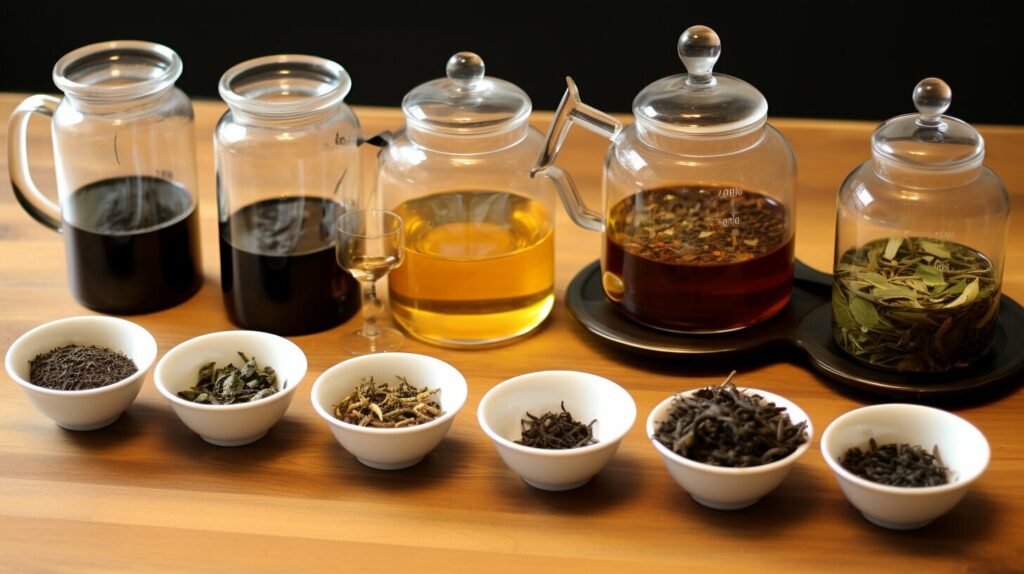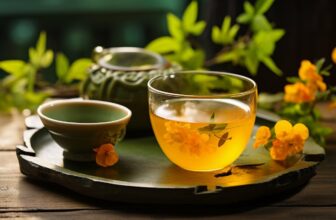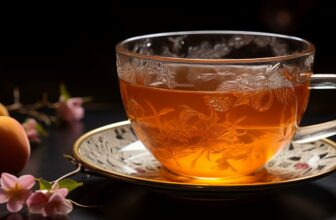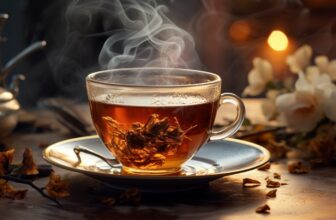
When it comes to tea, there are countless varieties to choose from, each with its own distinct characteristics and flavors. Two popular options that often spark a debate among tea enthusiasts are black tea and oolong tea. Both have loyal followings, but what sets them apart? Let’s take a closer look at the differences between black tea and oolong tea to help you make an informed choice.
Key Takeaways:
- Black tea and oolong tea have distinct characteristics and flavors.
- Black tea undergoes full oxidation, resulting in a strong and robust flavor.
- Oolong tea falls between green and black tea in terms of oxidation and offers a range of fruity to floral flavors.
- Both teas offer health benefits, including cardiovascular health and digestion support.
- Experiment with different brewing techniques to find your preferred cup of tea.
The Production and Flavors of Oolong Tea
Oolong tea is a unique type of tea that undergoes partial oxidation during its production process. Derived from the Camellia sinensis plant, oolong tea falls between green tea, which is unoxidized, and black tea, which is fully oxidized. The oxidation process of oolong tea gives it a distinct flavor profile that sets it apart from other teas.
The flavors of oolong tea can vary greatly, offering a diverse range of taste experiences. From fruity and floral notes to woody and roasted undertones, oolong tea provides a wide array of flavors to suit different preferences. The level of oxidation determines the intensity and complexity of the flavors, with darker oolong teas typically exhibiting stronger flavors and aromas compared to lighter ones.
Not only does oolong tea offer a delightful sensory experience, but it also provides numerous health benefits. Research suggests that oolong tea may aid in weight loss by boosting metabolism and fat oxidation. Additionally, it may help regulate blood sugar levels, promote heart health, and support digestion. Regular consumption of oolong tea can contribute to overall well-being and a healthier lifestyle.
| Health Benefits of Oolong Tea | Flavor Profile |
|---|---|
| May aid in weight loss | Fruity |
| Promotes heart health | Floral |
| Supports digestion | Woody |
| Regulates blood sugar levels | Roasted |
Understanding Black Tea and its Benefits
Black tea is a beloved beverage that undergoes full oxidation during its production process. This results in a strong and robust flavor that many tea enthusiasts appreciate. Black tea is consumed worldwide and is known for its numerous health benefits, making it a popular choice for those seeking a delightful and nutritious beverage.
One of the key benefits of black tea is its positive impact on cardiovascular health. Studies have shown that regular consumption of black tea can help reduce blood pressure and lower cholesterol levels, thus promoting a healthy heart. Additionally, black tea has been found to contain antioxidants that can contribute to overall well-being and protect against certain diseases.
Furthermore, black tea can play a role in supporting a healthy digestion system. It has been found to aid in the digestion of food and promote proper gut health. This can lead to improved gastrointestinal function and alleviate common digestive issues.
To fully enjoy the benefits of black tea, it is recommended to brew it correctly. Use freshly boiled water and steep the tea leaves for about three to five minutes to achieve the perfect balance of flavor. Adding a slice of lemon or a touch of honey can enhance the taste while providing additional health benefits.
Health Benefits of Black Tea:
- Supports cardiovascular health by reducing blood pressure and cholesterol levels
- Rich in antioxidants that protect against free radicals
- Promotes healthy digestion and improves gastrointestinal function
As you can see, black tea is not only a delicious beverage but also offers various health benefits that can contribute to overall well-being. Incorporating black tea into your daily routine is a simple and enjoyable way to reap the rewards of this remarkable tea.
| Health Benefits | Black Tea | Oolong Tea |
|---|---|---|
| Cardiovascular Health | Reduces blood pressure and cholesterol levels | May help lower cholesterol levels |
| Digestion | Aids in digestion and promotes healthy gut function | Improves digestion and assists with weight management |
| Antioxidants | Rich in antioxidants that protect against free radicals | Contains antioxidants that support overall health |
Comparing the Health Benefits of Black Tea and Oolong Tea
Both black tea and oolong tea offer a wide range of health benefits due to their rich antioxidant content. These antioxidants help protect the body against free radicals, reduce inflammation, and support overall well-being. Let’s take a closer look at the specific health benefits of these two teas.
Health Benefits of Black Tea
Black tea is packed with powerful antioxidants called flavonoids, which have been shown to have numerous health benefits. One of the key advantages of black tea is its potential to improve cardiovascular health. Studies have found that regular consumption of black tea may help lower blood pressure and reduce the risk of heart disease.
Additionally, black tea is known to support digestion. It can soothe the digestive system, reduce inflammation in the gut, and promote healthy bowel movements. Some research also suggests that black tea may aid in weight management by boosting metabolism and promoting fat oxidation.
Health Benefits of Oolong Tea
Similar to black tea, oolong tea is rich in antioxidants that can protect against cellular damage and boost the immune system. Oolong tea is often praised for its potential weight loss benefits. It contains compounds that can increase fat burning and promote the breakdown of stored fat.
Oolong tea may also have a positive impact on blood sugar control. Studies have shown that oolong tea can help regulate blood sugar levels, making it a valuable addition to a diabetes management plan. Additionally, some research suggests that oolong tea may support brain health by improving cognitive function and reducing the risk of neurodegenerative diseases.
| Health Benefits | Black Tea | Oolong Tea |
|---|---|---|
| Cardiovascular Health | May lower blood pressure and reduce the risk of heart disease | – |
| Digestive Health | Can support healthy digestion and promote bowel regularity | – |
| Weight Management | May boost metabolism and aid in fat oxidation | Promotes fat burning and breakdown of stored fat |
| Blood Sugar Control | – | Can help regulate blood sugar levels |
| Brain Health | – | May improve cognitive function and reduce the risk of neurodegenerative diseases |
While both black tea and oolong tea offer distinct health benefits, it’s important to note that individual responses may vary. It’s always a good idea to consult with a healthcare professional before making any significant changes to your diet or lifestyle.
So whether you prefer the strong flavor of black tea or the diverse flavors of oolong tea, rest assured that both choices can contribute to a healthier you.
Brewing Methods and Tips
When it comes to brewing oolong tea and black tea, there are a few key factors to consider in order to create the perfect cup. These brewing methods and tips will help you unlock the full flavors and aromas of these delicious teas.
Preparing Oolong Tea
When brewing oolong tea, it’s essential to start with fresh, filtered water. The water temperature should be around 190-200°F (88-93°C). Use approximately 2 grams of loose-leaf tea per 8 ounces of water, or adjust the amount based on your desired strength. Steep the tea for about 3 minutes, but feel free to experiment with shorter or longer steeping times to find your preferred taste. Once the steeping time is complete, strain the tea leaves and pour the liquid into your favorite teacup or mug. Enjoy the delightful flavors and aromas of oolong tea.
Mastering Black Tea Brewing
For black tea, the preparation process is similar to oolong tea. Start with fresh, filtered water and bring it to a rolling boil. The water temperature should be around 200-212°F (93-100°C). Use about 2 grams of loose-leaf black tea per 8 ounces of water or adjust according to your preference. Steep the tea for approximately 3-5 minutes, again adjusting the time to achieve your desired strength. Once the tea has steeped, strain the liquid and pour it into your cup. Take a moment to appreciate the bold and robust flavors of black tea.
Brewing Tips
Here are a few additional tips to enhance your tea brewing experience:
- Experiment with different tea-to-water ratios to find your perfect balance.
- Consider using a tea infuser or a tea strainer to make the brewing process easier.
- Try using a teapot or a tea kettle specifically designed for oolong or black tea brewing.
- Explore different flavors by adding a splash of milk or a dash of honey to your tea.
Remember, the art of tea brewing is subjective, and what matters most is finding your personal preference. So don’t be afraid to experiment and discover your own perfect cup of oolong or black tea.
Conclusion
In conclusion, when it comes to choosing between black tea and oolong tea, it ultimately boils down to personal preferences and desired health benefits. Both of these teas offer distinct flavor profiles and have their own unique characteristics.
Oolong tea stands out with its diverse range of flavors, ranging from fruity to floral. Its moderate oxidation levels provide a balanced taste that appeals to many tea enthusiasts. On the other hand, black tea is known for its bold and robust flavor, making it a favorite among those who prefer a stronger brew.
Regardless of which tea you choose, both black tea and oolong tea provide numerous health benefits. They are rich in antioxidants that help protect the body against free radicals and oxidative stress. Both teas also support overall well-being and have been linked to improved cardiovascular health, digestion, and immune system support.
So, whether you prefer the elegant flavors of oolong tea or the boldness of black tea, both choices offer a delightful and healthy tea-drinking experience. Indulge in the rich world of black tea and oolong tea and explore the unique flavor profiles and health benefits they have to offer.
FAQ
What is the difference between black tea and oolong tea?
Black tea undergoes full oxidation, resulting in a strong and robust flavor, while oolong tea falls between green and black tea in terms of oxidation, with a unique flavor profile ranging from fruity to floral.
Where is oolong tea traditionally produced?
Oolong tea is traditionally produced in China and Taiwan, but it is now available from other countries as well.
What health benefits does black tea offer?
Regularly drinking black tea has been linked to improved cardiovascular health, including reducing blood pressure and cholesterol levels. It also supports a healthy digestive system.
What are the health benefits of oolong tea?
Oolong tea offers several health benefits, including improved digestion, weight loss, and cholesterol reduction. It is also rich in antioxidants and supports the immune system.
How do I brew oolong tea?
Start with fresh water and use approximately 2 grams of loose-leaf tea per cup. Steep for about 3 minutes before straining and enjoying.
How do I brew black tea?
Brew black tea using similar methods as oolong tea, with variations in steeping time and water temperature. Experiment with different brewing techniques to find your preferred cup of tea.







